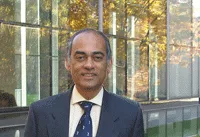
Despite the fact that his family wasn’t initially keen about his switch from science to philosophy, Matthen stayed with it, pursuing both a master of arts at Delhi University and a PhD at Stanford in philosophy. And although Matthen says (with just a hint of irony) that “philosophers don’t go to the lab – they lead very inactive lives,” he has led a distinguished career in the field having edited several books, with many published articles and reviews under his belt, and has served such notable positions as the associate dean of arts from 1992-97 at the University of Alberta, and head of the department of philosophy at UBC from 1999-2004. Currently he is the Canada Research Chair in Philosophy, Perception, and Communication, conducting research that will contribute to the development of an integrated framework for perception and visual representation in various species.
Matthen’s main focus is a conceptual perspective of perception in humans and other animals; how human perception is specialized, and how it is different from that of a bird or a fish. Humans use their colour vision to make sense of fine patterns of vegetation in their ancestral arboreal environments, while birds are interested in three-dimensional direction finding in a space without landmarks, and fish with things that are illuminated from above. The visual systems of each species deliver different kinds of information, and they have to solve different problems. “There is no reason to think that their worlds look the same to all of them,” Matten says.
Matthen works on his “theoretical knot of problems” by looking at the organism in what it does and how it responds, but he is also interested in its evolutionary history as well. His research maintains a conceptual viewpoint, but it also relates to science and Matthen likes to see how these various angles shed light on problems which philosophers have traditionally tackled such as knowledge, how perception provides knowledge and reasons for acting. While he feels that his science background helps him because of the kind of philosophy he does, Matthen says that it certainly isn’t necessary training for most philosophers. “In a sense, what I do is philosophy of science, and so I think I understand a bit what the scientific way of thinking is,” he says.
Upcoming projects for Matthen include a follow-up to his recent revolutionary book Seeing, Doing and Knowing: A Philosophical Theory of Sense Perception, which was a reworking of the established framework for the study of perception. Whereas this first book focused on perception from the outside, the next book is more about perception from the inside and how organisms deal with the world. Matthen also wants to further explore the perception of memory. He is interested in how human beings and other animals relate to their environment, which requires getting information from the environment (indicating how circumstances are changing), and then keeping records of the changes and the consistencies of that environment. Matthen explains that one then acts on the environment in two ways: by gaining information about it, and by actively trying to change it or take advantage of it for one’s own purposes, such as finding food or navigating directions.
Looking for food and navigating directions are two actions that would serve to indulge Matthen in some of his other favourite pursuits, which includes socializing and entertaining. Going out or having guests over to cook for them are among his preferred extra-curricular activities. He makes a variety of dishes, and enjoys buying fresh food and produce at local markets. If he finds a really great cookbook with a type of cuisine that he had not previously explored, Matthen says that he will become quite focused on these new dishes. Currently he has been enjoying the Mexican cookbooks of Diana Kennedy. “It’s a bit difficult to get some of the ingredients sometimes, but it’s been a revelation,” says Matthen. “You just discover completely new ways of doing things.”
Despite this enchantment that comes from discovering uncharted culinary terrain, one of the elements that Matthen appreciates about studying philosophy is the perseverance that is required to examine and revisit the same issues time and again. “It’s very often the case that what people generally think to be true and commonsensical, turns out not to be true,” Matthen explains. “And the more you probe it, the more that’s the case.” When asked about the value of studying philosophy, Matthen says that the way in which people pose their problems is important to the solutions they will reach. “I think that philosophy has something to contribute in formulating what sorts of questions are important,” says Matthen. “And I think that philosophers have a lot to contribute in formulating the way a discipline poses its questions and assesses its answers.”
By Carla DeMarco
